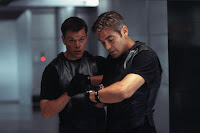Sorry for the slight delay. Stupid work with their stupid assignments that let me pay my stupid rent…
Anyway…
Speaking of things getting in the way, a common writing term is the obstacle. It’s what stands between your characters and whatever it is they want. While opinions vary on the topic, in my opinion an obstacle is slightly different from a conflict because obstacles tend to be exterior, while it’s very possible for conflicts to be interior. I prefer to use the term challenge, personally. I’ve found that thinking about “obstacles” tends to guide the mind solely onto physical impediments, like parts of an obstacle course. While this isn’t technically wrong, it does tend to result in a lot of the same things.
There are tons of different things people can want, for a number of different reasons. They can want that foreign prisoner back in America. You can want to find the Ark of the Covenant before the Nazis do. To get that alien implant out of their skull. Or to tell Phoebe O’Brien from sixth-period English you think she’s the most beautiful person you’ve ever known. These are all solid goals.
Likewise, there are even more things that can be between these characters and their goals.
A few tips on challenges…
A challenge must exist
Yeah, this sounds like a basic one, I know, but it’s surprising how often I see stuff where characters just stroll through a story with minimal effort. Looking for a clue to that mystery? There’s one over there. Need a boyfriend or girlfriend? Not any more. Villain waaayyyyy outclasses you? Good thing they told you about their Achilles heel and then left it open and exposed. This sort of thing shows up in fiction and scripts far, far more than you’d like to believe.
There needs to be some sort of challenge between your characters and their goals. If there isn’t, they would’ve accomplished these goals already. If I want a soda, I go and get one from the fridge– that’s it. Hardly the stuff great stories are made from, because there’s no challenge. If I want to drink my soda from a Faberge egg while Phoebe massages my feet… that’ll require a bit more effort on my part.
A challenge needs a reason to be confronted
If your characters are going to take on a challenge, they need a reason to do it. A real reason. Nobody sneaks or fights their way onto an enemy base just for the heck of it. They’re not here because there wasn’t anything else to do on Thursday night, but because millions of lives depend on the information this prisoner has and the enemy is torturing it out of him. You don’t tell Phoebe she’s beautiful for the heck of it, you tell her because you’ve wanted to for months and never worked up the nerve and now your parents are moving and you’ve only got two weeks of school left to let her know how you feel.
A big trick here is to make sure this reason is really there. It may be obvious in your head why the characters are going to undertake this challenge, but is it that clear on paper? This also holds for less physical things like Phoebe-confrontation, where the audience needs to understand why talking to her is such a big deal for this character.
A challenge has to be daunting
That base has over a hundred armed guards, attack dogs, barbed wire, starlight-scope cameras, and a minefield along the north perimeter. And if you think that sounds rough, Phoebe always has two or three friends with her, which means you’ll have to figure out a way to get her away from them, but they’re still going to know what you’re talking to her about. Characters should never want to deal with a challenge, because let’s be honest– we’d all love it if more things were just handed to us. That enemy agent. The alien brain implant. Phoebe’s heart (emotionally speaking).
Much as a challenge needs to exist, it needs to be something that gives the character (and the audience) pause, or else it isn’t really a challenge. Even John Carter, greatest swordsman on two worlds, would occasionally look at the odds he was facing and say “Oh…crap.”
Well, he was always a bit more eloquent than that, but you get the point.
A challenge cannot be impossible
If you’ve ever watched a boxing match, or any sporting event, you’ve probably noticed they’re evenly matched. NFL teams don’t take on pee-wee football teams. Rarely do you see someone like Vin Diesel beating on a person with a Woody Allen-esque physique. Well, not outside of high school, anyway…
The most boring stories tend to be the ones where the protagonists have no chance whatsoever of meeting the challenge. If you’ve ever watched a horror movie where the killer is merciless, unstoppable, and inescapable… well, that gets pretty dull after the second or third kill, doesn’t it? One of the reasons Jason Voorhees was always terrifying is that he never ran, he just sort of… marched (well, in the original films, anyway). You always had this sense that someone should be able to get away from Jason. Maybe if they could go a little faster…
The other risk to be wary here is if the challenge is completely impossible and your protagonist pulls it off anyway, it can look unbelievable and knock your audience out of the story.
A challenge needs a reason to exist
A combination of the first two points. If you’ve ever seen Galaxy Quest, you probably remember the mashing hallway which–as Sigourney Weaver loudly points out– serves no purpose whatsoever. We can probably all think of a book or movie where, for no reason at all, an obstacle just popped out of nowhere. Or perhaps it was there all along, but you couldn’t figure out why if your life depended on it. That’s false drama, and it just weakens writing.
Challenges have a purpose. They’re characters in their own right, or maybe obstacles other characters have (for one reason or another) set in your protagonist’s way. One of Phoebe’s friends can’t be a queen bitch just because the writer needs a bitchy character to thwart our love struck hero. Why would Phoebe hang around with someone like that? Think about why they’re doing this, and if you don’t have a real reason, stop for a couple minutes and re-think this particular challenge.
A challenge should be unexpected
This one’s not ironclad, but I’d still lean heavily towards it. If your characters are prepared, well-equipped, well-rested, and waiting for conflict, it’s not quite the same as when its sprung on them and they have to make do. It’s really cool to see the guys deal with sneaking onto the base, but it’s even cooler when they get there and what the #&$%!! Are those motion sensors? Why didn’t we know about those? Okay, everyone stay calm, here’s what we’re going to do…
A small bonus of the unexpected challenge is that it often gives your characters a chance to look clever. When they beat the unexpected challenge (even by the skin of their teeth) it makes them all the more likeable.
A challenge needs a resolution
If we see the set up, we have to see it resolved somehow. As Chekhov once said, if we see a phaser on the bridge in act one, we need to see it fire in act three. The squad needs to make it onto that base or die trying or at least they have to decide they can’t make it and that prisoner isn’t worth it. Once we, as writers, present a challenge to the audience it can’t be forgotten or ignored. We can’t spend the first quarter of our story pining for Phoebe and then never, ever address those feelings again.
Next week might be a bit tight again, as I’m heading into deadlines. But if all goes well, I’ll be here on time on Thursday. Don’t get me wrong, I’d much rather be working on this than some of the assignment I have.
Actually, that’s what I wanted to talk about next week. Not getting me wrong.
Until then, get some writing of your own done.





